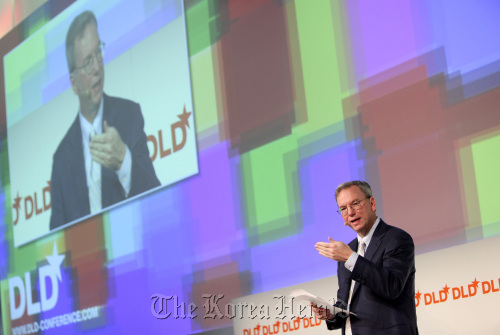PARIS (AFP) ― The world’s most powerful Internet and media barons gather in Paris on Tuesday in a show of strength to leaders at the G8 summit, amid international rows over online access, copyright and regulation.
Top executives from online giants like Google, Facebook and Microsoft will tout the economic potential of the Internet, which their host, French President Nicolas Sarkozy, has put on the agenda of the G8 summit two days later.
After Tuesday and Wednesday’s “e-G8” bash, some of the biggest names will then meet with G8 leaders at the summit in Deauville, northwestern France, on May 26 and 27, a French presidential official said.
 |
Eric Schmidt, chief executive officer of Google Inc. (Bloomberg) |
“For the first time, voices of companies, thinkers and major players who build the Internet will be heard at the highest levels of world politics,” said a statement by PR firm Publicis, commissioned by Sarkozy to organize the e-G8.
With blogs and Tweets oiling the wheels of revolutions in some countries and scans and downloads sparking trade disputes in others, the stakes are high for leaders seeking to promote and profit from the Web but also to regulate it.
The e-G8 “aims to enlighten and to nourish the discussions of the heads of G8 nations with the vision of the Web actors regarding the Internet’s importance and impact on society and the economy,” the organizers said.
But some bloggers and activists saw the e-G8 not as a gesture of openness but a bid to tighten governments’ grip on the Internet for power and money.
“Under the guise of a pseudo-consultative process, it is the governments’ desire to control the Internet a bit more that is becoming apparent,” French Internet freedom campaign group Le Quadrature du Net wrote on its website.
“Behind the smokescreen of this ‘forum’, citizens must hold world leaders more responsible for their actions and denounce the many continual breaches of their liberties.”
Authorities in several countries have clashed with Google, the world’s biggest Internet search engine, notably in China, where the company accused the government of hacking dissidents’ email accounts.
France is expected to propose a statement in Deauville on “respecting freedoms” on the Web, a French official said ― a jab at censorship in rising world powers such as China.
But, while acknowledging the Internet’s power as a force for freedom elsewhere, western countries’ differ on how to harness or curb it on their own doorsteps.
Media freedom campaigners including Reporters Without Borders have criticized moves by some European countries, such as a recent French law making Web users liable to prosecution if they illegally download films and music.
German and Italian regulators have placed restrictions on Google’s Street View, over privacy concerns for people photographed in its online street maps.
In France, several publishers accuse Google of scanning their copyrighted books for its online library, although one major publisher, Hachette Livre, has struck a deal with the Californian company.
Sarkozy has called for “a civilized Internet” and has proposed another gathering, on online copyright protection, ahead of the November meeting of leaders of the Group of 20, a bigger club of rich and emerging powers.
This drive may worry the United States, sensitive to talk of regulation.
The e-G8 guests include the executive chairman of Google, Eric Schmidt; the founder of social site Facebook, Mark Zuckerberg; and Jeff Bezos, founder of online retail giant Amazon. Microsoft will also be represented.
Also attending is Rupert Murdoch, the billionaire head of the global media empire News Corporation, which includes Fox News and the Wall Street Journal, and dubbed by Forbes magazine “the man who owns the news.”
Murdoch’s recent decision to start charging for content on news websites rattled the media world, where companies are struggling to work out how to make money from journalism in the Internet age.
France touted the meetings of the e-G8 and the G8 as an unprecedented meeting of the online and political worlds.
“The wish of the heads of state is to hear the world’s top Internet figures talk about their vision for the future so that they can incorporate it in their own decisions,” a French presidential official told reporters.








